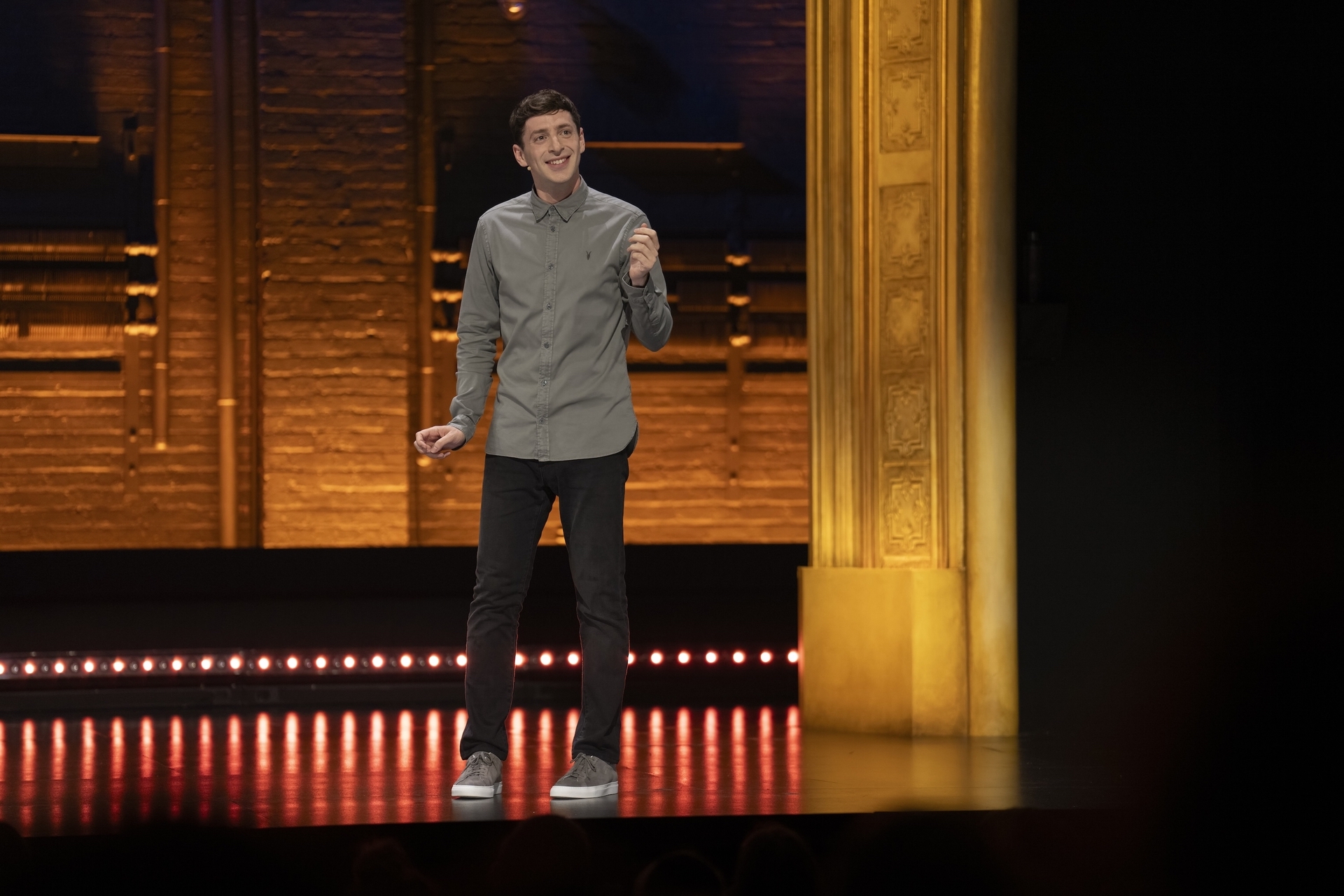
For promotional purposes, I am often asked to sum up Just For Us. Sometimes, I get very technical and say it’s a comedy-theater hybrid, or a solo show about assimilation or something high-minded, but what usually happens is that the interviewer stares at me until I give them what they want. Which is this:
Just For Us, if you must know, is a show about a guy who attends a meeting of White Nationalists in Queens. The thing that makes this hooky, presumably, is the fact that that guy (me, I’m the guy) was raised as an Orthodox Jew.
Eventually, I’m found out. The resultant story, as crafted for the stage with a few related comedic tangents, wound its way through the Anglophone live comedy world over the past six years, making some fun stops—Broadway, Montreal, Australia—before it airs on HBO April 6.
And the thing I like most about my corner of the pixelated comedy landscape, my own stall now set out at the farmers market of online streaming, is the tens of thousands of people who have come to see it live; stopped and visited and left their fingerprints on my countertop. In the comet’s tail behind the show there have been innumerable conversations afterwards in the lobby, bar, or the middle of the sidewalk outside the venue. Anyone with the patience and wherewithal to ask a question, has.
Not all the conversations have been good or illuminating. There are a lot of watery compliments, or Jewish geography (over the five years I attended a Jewish summer camp, I seem to have overlapped with literally everyone’s cousin). A nice man in Detroit complained that I don’t offer any answers, only more questions. Fair. The queries aimed at me mostly revolve around the White Nationalists in the room that night back in 2018. Am I still in touch? I am not. Would I do it again? Yes. Have any of them seen the show? No idea. I thought I saw one of them in Union Square in 2022, but going up to a stranger to ask, “Hey, do I know you from a meeting of White Nationalists?” struck me as a bad move.
Because of the nature of live performance, and the way we tell stories, some of those conversations, besides being a more explicit window into what people respond to, have found their way into the show itself—which is wild. The show is different from the show it was six months ago, a year ago, six years ago. I didn't even present as Jewish in the original draft of it. To offer work that is a living thing, responsive to the world around it, is a unique experience. It’s a bit like if you were watching a movie and DiCaprio got to look directly into camera and say, “People get really sad here, when we hit the iceberg.” Live theater! It’s the best.
And in the post-show conversations that light me up the most, I find my tribe: people animated by curiosity or a unique approach to discourse. They’re interested in the craft of telling a story, or they talk about a time where they connected with someone very different from them, or offer an anecdote about wandering into a room where they did not belong. After a show in Wales, out of nowhere, a woman in her seventies told me she liked “that I knew enough to listen” in that room. When I told her that the opinions at this meeting of White Nationalists were pretty offensive, regressive, etc., she said to me, genuinely baffled, “What does that have to do with listening?”
Read more: How to Have More Meaningful Conversations
I now see that extant desire to listen and be heard, to be seen and understood, in so much. I catch glimpses of it in our newspapers, in courtroom testimonies, on Love is Blind.
I read once that there is nothing more romantic than being seen, and the average American is, in my opinion, looking for romance. I’m not naive enough to think that we can head for a kumbaya moment that sees MAGA conservatives locked in tear-soaked embrace with Joy Behar, but I’m encouraged by that desire for understanding—especially from those who are different from us. I think it accounts for a huge amount of the resonance that Just For Us has had.
A few weeks ago, after a show in Atlanta, someone asked me, framed through their anger at another’s position on the current conflict in Gaza, “What should be the limits of our empathy?” I told them that I don’t know, but I think the more you can extend, the more of the opposing perspective you can come to grips with, the higher your chances are of reaching something productive. It’s an answer I don’t know that I would’ve given six years ago. I’m resistant to “what I’ve learned” stuff from comedians and solo show artists—it’s very pat—but I can say what’s changed for me. Which is that I’ve found much more productivity when I can remove my self-righteousness from my arguments. I’ve found a surprising appetite for grace in the average person. And, I’ve found so much more comfort in asking questions than offering answers. Sorry, guy from Detroit.
Alex Edelman is a comedian and writer based in New York City. His debut comedy special Alex Edelman: Just for Us premieres on Saturday, April 6 on HBO and streaming on Max.
More Must-Reads from TIME
- Cybersecurity Experts Are Sounding the Alarm on DOGE
- Meet the 2025 Women of the Year
- The Harsh Truth About Disability Inclusion
- Why Do More Young Adults Have Cancer?
- Colman Domingo Leads With Radical Love
- How to Get Better at Doing Things Alone
- Michelle Zauner Stares Down the Darkness
Contact us at letters@time.com